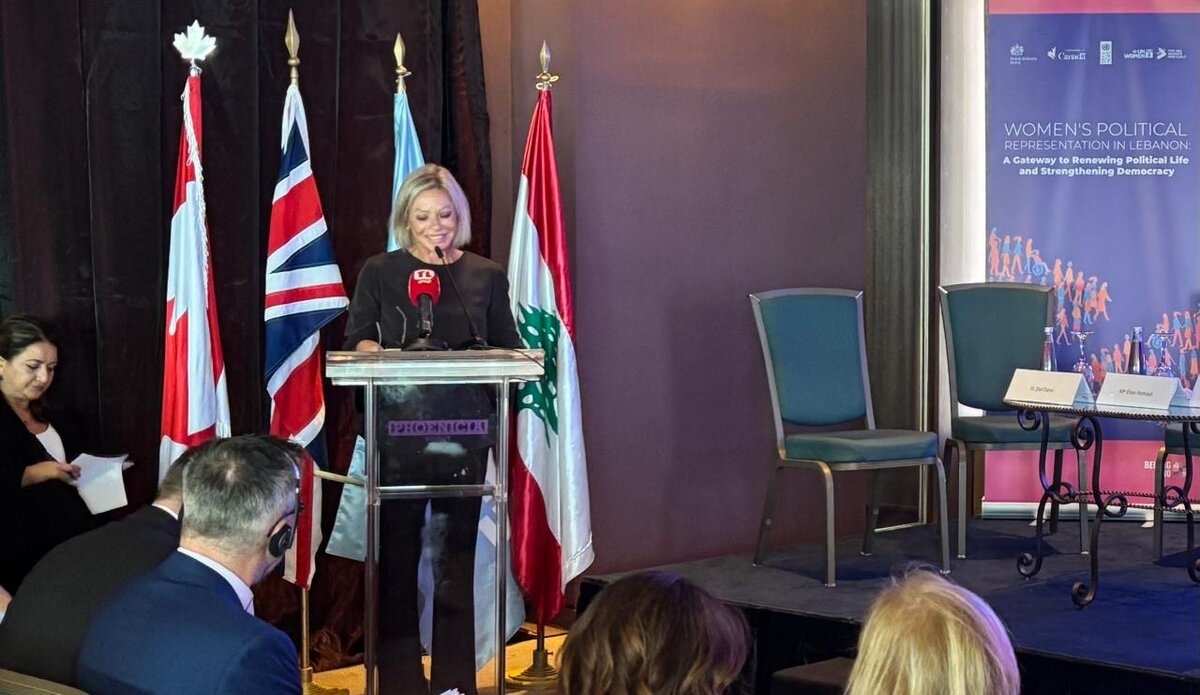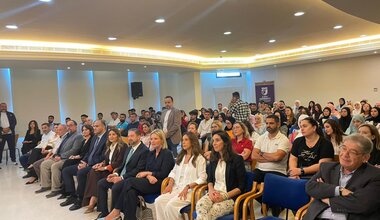Research sheds light on women in Lebanese political parties ahead of 2026 elections
Under the patronage of H.E. Mr. Nawaf Salam, President of the Council of Ministers of Lebanon, UN Women Lebanon and the Office of the United Nations Special Coordinator for Lebanon (UNSCOL) today unveiled a landmark research paper: “Lebanese Women: From Political Participation to Party Leadership.”
This first-of-its-kind research paper shines a spotlight on women’s presence inside Lebanon’s eight major political parties. It reveals both progress and persistent gaps in women’s membership, candidacies, nominations, and access to leadership positions, while laying out clear, actionable steps to advance equality and strengthen democracy ahead of the 2026 parliamentary elections.
Her Excellency the Minister of Social Affairs, Hanin El Sayed, represented Prime Minister Dr. Nawaf Salam and delivered his speech on his behalf, in which he stated:“Promoting women's participation in political life is not merely a rights-based demand, but a prerequisite for building a balanced democracy that offers our nation a fairer and more representative image of its social and cultural diversity. The success of any political reform process remains incomplete unless women are full partners in shaping the future.”
Despite gaining the right to vote and run for office more than 70 years ago, Lebanese women remain under-represented in political life. Since 1953, only 17 women have served in the Lebanese Parliament, underscoring how far the country still has to go to achieve equal democratic representation.
“Barriers do exist, and they are very real. The good news is that many opportunities for action are identified in the study. From legislative priorities and policy changes within political parties to broader initiatives, like financing support or flexible arrangements. And certainly, with the 2026 elections inching closer, there has never been a better time to seize these opportunities,” said Jeanine Hennis-Plasschaert, United Nations Special Coordinator for Lebanon.
The research reveals that women make up between 15 and 58 per cent of party membership, averaging 35 per cent. Yet these numbers collapse at senior levels: women often hold fewer than 20 per cent of senior seats and as little as 5 per cent of top executive roles. While women’s candidacies increased modestly from 12.1 per cent in 2018 to 15.7 per cent in 2022, only five women from party lists were elected in 2022.
Behind these figures lie systemic barriers: opaque candidate selection processes dominated by small leadership circles, weak enforcement of voluntary party quotas, limited internal policies to combat sexual harassment, unequal access to financing and media, and the absence of family-friendly arrangements.
“This research is both a mirror and a road map. It reflects the realities women face inside Lebanon’s political parties, and it sets out practical steps to move forward. Advancing women’s political participation is not just about fairness - it is about renewing political life and strengthening Lebanon’s democracy,” said Gielan Elmessiri, UN Women Representative in Lebanon.
The research urges concrete reforms from political parties, institutions, and international partners, including:
- Adopting temporary special measures such as gender quotas;
- Introducing transparent, enforceable nomination mechanisms;
- Developing and applying strong policies to address violence and harassment against women in politics;
- Ensuring women’s fair access to campaign financing and media.
Speaking at the event, H.E. Hamish Cowell, Ambassador of the United Kingdom to Lebanon said: “The UK is proud of its partnership with UN Women to advance women’s representation in politics in Lebanon. Building on the success of female candidates during the last municipal elections, we hope to see further female representation in the results of the May 2026 parliamentary elections. This conference is an important step towards more inclusive political representation in Lebanon.”
Further affirming this call to action, H.E. Gregory Galligan, Ambassador of Canada to Lebanon, added: “Canada is proud to support initiatives that amplify women’s voices in Lebanon’s political life. Women’s perspectives, ideas, and leadership strengthen democracy and help societies chart a more stable and prosperous course. With the 2026 parliamentary elections approaching, we encourage all political parties to nominate more women candidates and to ensure women’s voices and vision are central to national debates. Canada will remain a committed partner in advancing gender equality and inclusive governance in Lebanon”.
Produced jointly by UN Women and UNSCOL, with financial support from the Government of Canada and the British Embassy in Lebanon, this research offers a critical evidence base to guide reforms. With parliamentary elections on the horizon in 2026, it provides a timely opportunity to spark dialogue and drive inclusive governance; renewing political life and strengthening democracy in Lebanon, in line with Lebanon’s commitments under the Convention on the Elimination of All Forms of Discrimination against Women (CEDAW) and the International Covenant on Civil and Political Rights (ICCPR), as well as the priorities of the Sustainable Development Goals (SDGs), in particular Goal 5, which focuses on advancing gender equality and women’s empowerment as an urgent peace and development priority.
 UN
UN





